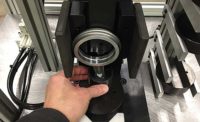Numerous start-up companies located far from Detroit are attempting to carve out a niche in the green car market. Unfortunately, they face huge obstacles, such as the global recession, low gas prices and the credit crunch, that will limit their ability to succeed.
“A lot will depend on price and performance of the vehicles,” says Anjan Kumar, a senior research analyst at Frost & Sullivan Inc. (San Antonio). “It will depend on how far they succeed in branding themselves in the premium class. [Some companies are developing] performance-oriented sportscars that could match the likes of Porsche. Right now, there is little competition to such companies [from] traditional manufacturers. Clear branding strategy and delivering [on their promises] will help them succeed in the market.”
Other observers question whether many of the start-ups will ever get beyond the dream stage. Dave Cole, chairman of the Center for Automotive Research (Ann Arbor, MI), says one of the most popular startups encountered numerous problems once it actually started to assemble a prototype vehicle. “They quickly found out that building a car is a very complex process,” he explains. “The Silicon Valley venture had to bring in a lot of automotive guys to solve their problems.”
“All of these companies face a somewhat common obstacle in that they must have a mainstream product that sells in volumes high enough to reach a favorable economy of scale,” adds Daniel McGillis, global business development manager at ABB Robotics (Auburn Hills, MI). “If not, they will continue to be niche players in the overall market, making them highly susceptible to global market shifts. Since none of these companies seem to own patentable technologies, I don’t see them being wildly successful.”
Here’s a brief look at a few of the players in the electric car market and their ambitious, pie-in-the-sky production plans:
-
Tesla Motors Inc. (San Carlos, CA) is the best-known start-up. Its $109,000 Roadster has attracted widespread attention because of its sleek design and quick performance. The sportscar is currently assembled by Group Lotus PLC (Hethel, England). Tesla has already sold more than 1,200 vehicles and plans to build a $250 million assembly line in San Jose, CA. The company has developed a $60,000 four-door sedan called the Model S that it hopes to begin producing in California by 2011. "The company has clearly taken production of all-electric vehicles to the next level, and the Model S assembly plant will dramatically accelerate our growth," says Elon Musk, Tesla's chairman.
-
Fisker Automotive Inc. (Irvine, CA) unveiled its first production car, the Karma, last month at the North American International Auto Show in Detroit. The start-up company plans to use parts supplied by General Motors Corp. (Detroit), such as a 4-cylinder gasoline engine that will be used when a driver exceeds the 50-mile electric-only range. The Karma will be assembled by Valmet Automotive Inc. (Uusikaupunki, Finland), a contract manufacturer than has built more than 1 million vehicles for customers such as Porsche and Saab. “A hybrid drive train, battery technology and a new body design with lightweight materials is a great challenge to our engineering and production teams,” says Ilpo Korhonen, Valmet’s president. The company, which plans to assemble 15,000 Karma’s per year, is currently building a new body welding line for the vehicle.
-
Aptera Motors (Carlsbad, CA) has developed an aerodynamic three-wheeled electric vehicle called the Typ-1. The composite-bodied car boasts a wide operating range due to lightweight construction inspired by the aerospace industry. The company plans to assemble the vehicle in Vista, CA. Its goal is to have 100,000 vehicles on the road by 2015.
-
Pininfarina spa (Turin, Italy), a legendary design firm, has teamed up with Bollore (Puteaux, France) to create an electric car called the B Zero. It uses a proprietary lithium-polymer battery that will be assembled in a factory in Montreal. Lithium-polymer batteries use a chemistry that’s similar to lithium-ion batteries, but feature a solid electrolyte that allows battery manufacturers to place cells in extremely thin packages. Pininfarina plans to start assembling the vehicle next year, with full-scale production scheduled for 2011.
-
Porteon Electric Vehicles Inc. (Portland, OR) hopes to begin manufacturing a $10,000 electric car designed for urban use. The company plans to assemble its vehicles in Portland and is trying to raise $15 million to ramp up production. It vaguely claims that it will use “sustainable manufacturing” to produce “a highly modular product line.”
-
Venturi Automobiles (Monte Carlo) unveiled its Volage GT concept at the recent Paris Motor Show. The electric vehicle uses in-wheel motors developed by engineers at Michelin (Clermont-Ferrand, France). It plans to build an assembly plant in the Loire region of France to begin mass-producing the vehicle in 2012.
- AirShip Technologies Group (Lake Oswego, OR) appears to be one of the wackiest of all the startup green automakers. It proposes to build a car that would run on “electric-powered track-spheres” that would replace traditional wheels and tires. The company claims that it will use “a unique assembly process” that features star-shaped assembly lines. “In a radical departure from conventional assembly techniques, the initial plant configuration will have no automated conveyor systems to move the vehicle from one workstation to the next,” says Ben Berry, AirShip’s CEO. “Instead, each chassis will be mounted on a robotic dolly and moved to the next station only when the assembly team at the previous station is satisfied that it has performed its task completely and precisely.”



